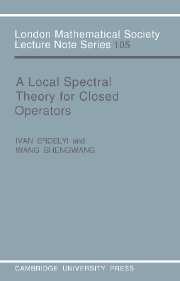Book contents
- Frontmatter
- Contents
- PREFACE
- Glossary of Notations and Symbols
- Chapter I INTRODUCTION
- Chapter II THE SPECTRAL DECOMPOSITION PROPERTY
- Chapter III SPECTRAL DUALITY
- Chapter IV SPECTRAL RESOLVENTS
- Chapter V SPECIAL TOPICS IN SPECTRAL DECOMPOSITION
- Appendix A The (**)-version of the predual theorem
- Appendix B Some open problems
- BIBLIOGRAPHY
- Index
Chapter I - INTRODUCTION
Published online by Cambridge University Press: 05 April 2013
- Frontmatter
- Contents
- PREFACE
- Glossary of Notations and Symbols
- Chapter I INTRODUCTION
- Chapter II THE SPECTRAL DECOMPOSITION PROPERTY
- Chapter III SPECTRAL DUALITY
- Chapter IV SPECTRAL RESOLVENTS
- Chapter V SPECIAL TOPICS IN SPECTRAL DECOMPOSITION
- Appendix A The (**)-version of the predual theorem
- Appendix B Some open problems
- BIBLIOGRAPHY
- Index
Summary
THE SPECTRAL DECOMPOSITION PROBLEM
In extending the spectral theory beyond the class of normal operators, N. Dunford [Du.1958] gives a formal definition of the spectral decomposition (reduction) problem, for a closed operator T acting on a complex Banach space X. To interpret Dunford's definition, one has to express X as a finite direct sum of invariant subspaces Xi, such that the spectra of the restrictions T|Xi be contained in some given closed sets.
For the class of spectral operators, the spectral decomposition is accomplished with the help of a spectral measure E: a homomorphic map of the σ-algebra of the Borel sets of the complex plane ℂ into the Boolean algebra of the projection operators on X, with unit I = E(ℂ). A spectral measure, countably additive in the strong operator topology, is uniquely determined by T (for unbounded spectral operators, see e.g. [Ba.1954]), and is referred to as the resolution of the identity (or spectral resolution) of T.
A generalization of the spectral operator concept is due to C. Foiaş [Fo.1960], who replaced the role of the spectral measure by that of the spectral distribution (for a full dress account of this theory see [C.1968] and [C-Fo.1968]).
- Type
- Chapter
- Information
- A Local Spectral Theory for Closed Operators , pp. 1 - 32Publisher: Cambridge University PressPrint publication year: 1985

